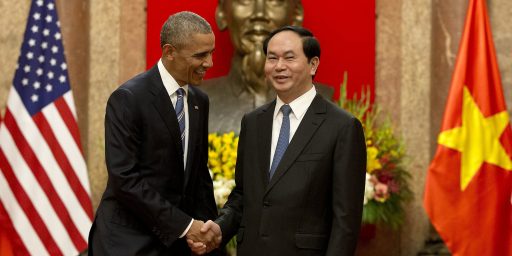Why Does Our Government Hate Vietnam?
Dan Drezner notes the latest bout of protectionism:
Bush Shields Shrimp Industry (Washington Times)
The Bush administration yesterday said Chinese and Vietnamese shrimp are sold at unfairly low prices in the United States, siding with U.S. fishermen as they try to fend off overseas competition.
The decision reaffirms new trade barriers on the country’s most popular seafood, though the new duties meant to counter the competition are not as high as requested by the industry.
“Although U.S. shrimpers believe the [Commerce] Department understates the amount of dumping in certain instances, they reaffirm our contention that shrimp is dumped in the U.S. market,” said Eddie Gordon, president of the Southern Shrimp Alliance, which represents shrimpers from North Carolina, South Carolina, Georgia, Florida, Alabama, Mississippi, Louisiana and Texas.
Vietnam and China have denied unfair competition.
“Our companies did not dump shrimp in the U.S. market,” said Chien Bach, spokesman at Vietnam’s embassy in Washington.
This case comes at the heels of “The Great Catfish War,” in which Commerce determined that Vietnamese producers were dumping “certain frozen fish fillets” at margins between 36.84% and 63.88%. But, prior to the determination, Congress had passed an amendment forbidding the Vietnamese from marketing their goods as “catfish”: they were forced to use the terms “basa” and “tra,” and only the American-born species, Ictaluridae, could be sold under that label. So, while one branch of government hammered the Vietnamese for their behavior in the catfish market, another branch declared that they weren’t part of it at all. Hypocrisy, anyone?
These trade practices would be fairly comical if they didn’t have such major economic implications. Vietnam’s catfish industry employs nearly half a million people in the southern Mekong Delta and sends a third of its exports here. Shrimp is even bigger: the US accounts for 45% of Vietnam’s shrimp export sales, and the industry employs 3.5 million people, most in poor rural areas.
This isn’t the way to lead the world toward liberalization.
Update (12/2 – James Joyner): Dan Drezner has some interesting words on this subject, too, in his post “Please, anything but cheap shrimp!!”






We talk out of both sides of our mouth when it comes to free trade. Our subsidies, and tariffs against developing countries’ agricultural products makes it almost impossible for them to compete on an equal footing, and to find a way out of poverty and to develop into more mature economies. But in the end, all politics are local and you need to please your constituents.
My local paper, the Sarasota Herald-Tribune runs a story on the front page of its “Florida West” section on sustainable seafoods. They republish a list of seafod under rubrics of “Best choices,” “Good alternatives,” and “Avoid”, citing the Monterey Bay Aquarium National Seafood Guide 2005.
Among the seafoods to avoid are “Shrimp (imported farmed or trawl-caught)”.
Are conservationists becoming part of the closed-market cliques, or is this just coincidence?
Let Vietnam take back all the Hmungs and boat people without retribution, then talk trade.
John,
Parts of the conservation movement has pushed for closed market initiatives or nativist legislation. Just this year a group of anti-immigration activists sought to take over the Sierra Club to turn it into an anti-immigration group.
Walter,
Why should they take back the refugees that came here or that we should make them go back? If they want to go back that’s their own business. Most of them are naturalized US citizens so they belong here just like any other American. The Hmong are a special case, and their devotion to the US cause during the war made them special in the eyes of their US counterpants, especially those in the special forces. They are still a neglected, or even targeted group in Vietnam because of their actions during the war.
Bubba Gump is Vietnamise?
Who knew?
I’m one of those hypocrites who is only interested in global markets when it benefits the US first. I think opening certain things to global free trade works out decently enough, but other things are suicidal to American interests. Yes, I’d love to help everyone, but I’ll help Americans first, thanks. I see nothing wrong with helping the American shrimp industry out. Shrimp still don’t cost all that much. I don’t really need to have the price dropped another 20 cents per pound just to help the Vietnamese shrimping industry.
Jazz Shaw: That’s an understandable sentiment, but I think we have to remember that other countries can retaliate against our protectionist measures. Perhaps the Vietnamese themselves can only do so in limited fashion. But certainly the EU and other developed countries can have an impact, and in this light, we have to consider whether protectionism is beneficial overall.
Bring back the Hawley-Smoot Tariff Act!